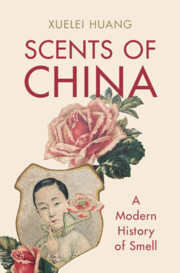Refine search
Actions for selected content:
2 results
3 - Deodorizing China
- from Part Two - Smellscapes in Flux
-
- Book:
- Scents of China
- Published online:
- 20 July 2023
- Print publication:
- 10 August 2023, pp 101-142
-
- Chapter
- Export citation

Scents of China
- A Modern History of Smell
-
- Published online:
- 20 July 2023
- Print publication:
- 10 August 2023
